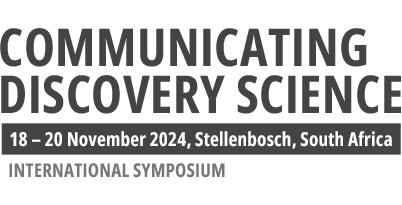Programme Day 2: 19 November 2024
TUESDAY 19 NOVEMBER 2024, DAY 2 – morning session
PLENARY 2: SCHOLARLY PERSPECTIVES ON COMMUNICATING DISCOVERY SCIENCE
Chair: Saahier Parker
Rapporteur: Sabine Heij
PRESENTATION
Does public engagement work? An empirical test
Bruce Lewenstein (Cornell University, USA)
Many of us involved in public engagement believe that it makes science itself better. But what do we mean by that? I’ll describe a discovery-focused scientific research project (about “programmable plants”) where we have embedded research about public engagement as a co-equal research theme to the natural science themes. We’re exploring how to assess what influence public engagement has on the scientists and science itself.
PANEL DISCUSSION
Building the infrastructure for effective discovery science communication
John Besley (Michigan State University, USA)
Marta Entradas (Instituto Universitario de Lisboa, Portugal)
Mike Schäfer (University of Zurich, Switzerland)
Sara Yeo (University of Utah, United States)
Organisations outside of science typically hire staff and develop procedures to build the relationships they need to succeed. Unfortunately, scientists rarely have access to this type of communication infrastructure and most science communication training focuses on helping individual scientists, not scientific organisations. This talk will share insights gained through multiple research projects that are seeking to better understand how scientists and scientific organisations are thinking about how to access engagement support. It will provide ideas on paths forward for both researchers and practitioners
PLENARY 3: SOUTH AFRICAN PERSPECTIVES ON COMMUNICATING DISCOVERY SCIENCE
Chair: Jeanne Garbarino
Rapporteur: Lili Rademan
PRESENTATIONS
The South African Public Relationship with Science Survey: Implications for science communication
Vijay Reddy (Human Sciences Research Council, South Africa) – View report
Isaac Ramovha (Department of Science and Innovation, South Africa)
South Africa recently conducted a comprehensive survey to assess the country’s progress toward becoming a more science-literate and science-aware society. In this presentation, we share results from the South African Public Relationship with Science (SAPRS) survey, covering 27 key measures. We will present the results for two high-level questions: (i) What are the current levels of science engagement measures? and (ii) What socio-demographic characteristics influence who is more and less likely to exhibit higher science knowledge, attitudes, access to science and technology information, participation in science engagement activities, and related behaviours and views? We then describe the unique social fingerprint of the South African public’s relationship with science.
Beverley Damonse (University of the Witwatersrand, South Africa)
The Wits Faculty of Science places a strong emphasis on enhancing the value of its research-led, public-facing science enterprises. As a result, entities such as the Sterkfontein Caves, Origins Centre, and Digital Dome are reimagining their approaches to communicating research and engaging with public audiences. This rethinking includes the introduction of a new multidisciplinary master’s degree in science communication.
RESPONDENT
Charting a pathway towards engaged research in Africa
Konosoang Sobane (Human Sciences Research Council, South Africa)
PLENARY 4: DISCOVERY SCIENTISTS REFLECT ON SOCIETAL ENGAGEMENT
Chair: Bruce Lewenstein
Rapporteur: Linka Maritz
PRESENTATION
Anusuya Chinsamy-Turan (University of Cape Town, South Africa)
In this presentation, I will share various strategies I have used to communicate my research in palaeobiology to the wider community. I have found that one needs to consider multiple ways to engage with different audiences, and in this talk, I will highlight some of the different approaches that I have used.
PANEL
Inspiring pupils – potentials and challenges of science communication in schools
Magdalena Eriksröd-Burger (University of Bamberg, formerly OeAD – Agency of Education and Internationalisation, Germany)
Postgraduate students’ perspectives on communicating their basic research
Melissa Vorster, Anika Du Plessis, Karla Redelinghuys (Stellenbosch University, South Africa)
Drawing from our diverse experiences as early-career interdisciplinary scientists, we aim to provide our perspective on the challenges of communicating basic sciences. We will elaborate on the difficulties of conveying abstract concepts in fields such as bioinformatics, computational modelling, and genetics, while maintaining the scientific validity of the research. Additionally, we will highlight the importance of collaboration between scientists and other professionals to bridge the communication gap between science and society.

